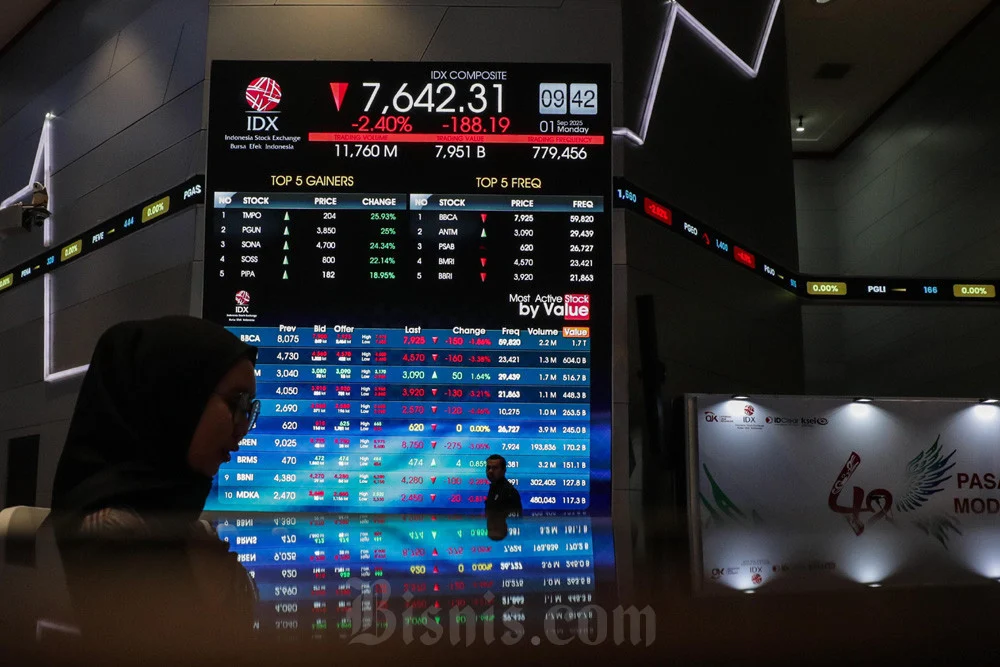The Indonesian Stock Exchange (IDX) entered September under heavy pressure as the so-called September Effect resurfaced, shaking investor confidence. The Composite Stock Price Index (Indeks Harga Saham Gabungan or IHSG) faced volatility driven by foreign investors selling shares, particularly from Indonesia’s largest banks such as Bank Central Asia (BBCA), Bank Mandiri (BMRI), Bank Negara Indonesia (BBNI), and Bank Rakyat Indonesia (BBRI). This wave of sell-offs reflects broader concerns about seasonal patterns in global markets and Indonesia’s financial resilience.
The term September Effect IHSG refers to the common belief that stock markets tend to underperform during September due to seasonal investor behavior, portfolio adjustments, and macroeconomic uncertainty. For Indonesia, where foreign capital plays a critical role in the stock market, this phenomenon raises deeper questions about investor sentiment and the stability of the banking sector.
Why the September Effect IHSG Matters
September has long been seen as a difficult month for equity markets around the world. Historically, major indices in the United States and Europe also report weaker performance during this period. For Indonesia, the September Effect IHSG has become a recurring concern because it coincides with several risk factors: anticipation of central bank decisions, fluctuations in commodity prices, and fiscal policy adjustments by the government.
Foreign investors, who account for nearly one-third of transactions in Indonesia’s capital market, often take September as an opportunity to rebalance portfolios. When they offload large positions in heavyweight stocks, especially the banking sector, it creates significant downward pressure on IHSG. The recent sell-off in BBCA and BMRI, two of the country’s most liquid stocks, illustrates how sensitive the index is to foreign capital movements.
More importantly, the banking sector is seen as the backbone of Indonesia’s stock market. Its performance often reflects investor confidence in the overall economy. Therefore, when foreign funds retreat from banks, it not only impacts valuations but also signals potential caution toward Indonesia’s broader economic outlook.
Impact on Big Banks and Market Liquidity
The September Effect IHSG has a particularly strong influence on Indonesia’s big banks because they dominate market capitalization and trading activity. BBCA alone represents more than 10 percent of the IHSG, meaning any significant movement in its stock price can sway the entire index.
Foreign investors reducing their exposure to BBCA and BMRI has led to short-term volatility. Daily trading volumes spiked as local retail investors tried to absorb the sell-off, but they were unable to fully stabilize prices. Market analysts have highlighted that such behavior is common during the September Effect IHSG, where foreign outflows tend to outweigh domestic buying power.
The impact is not just limited to stock valuations. Liquidity in the market can also tighten, as major institutional investors prefer to hold cash rather than risky assets. This can create a chain reaction where smaller-cap stocks also face declines, further extending the downward momentum of IHSG.
For banking stocks specifically, concerns also revolve around profitability and interest rate environments. If global monetary tightening continues, Indonesian banks may face higher funding costs, reducing their appeal to foreign investors. This macroeconomic backdrop amplifies the effect of seasonal sell-offs during September.
Investor Sentiment and Future Outlook
The September Effect IHSG should not be seen merely as a seasonal superstition. It represents a combination of investor psychology, historical trends, and economic fundamentals. Foreign investors, wary of global uncertainties such as slowing growth in China, US interest rate decisions, and geopolitical tensions, are more likely to reduce risk exposure in emerging markets like Indonesia during this period.
However, this presents opportunities for long-term investors. Many analysts argue that September declines often set the stage for recoveries in the following months. Historically, IHSG has shown strong rebounds in October and November, supported by year-end spending, corporate earnings, and government fiscal stimulus.
For domestic investors, the September Effect IHSG could serve as a buying opportunity, particularly for blue-chip banking stocks whose fundamentals remain strong. Indonesia’s economic growth continues to be supported by household consumption, infrastructure development, and digital transformation in financial services. Despite short-term volatility, the long-term outlook for banks like BBCA, BMRI, and BBRI remains positive.
At the same time, regulators and policymakers must monitor capital flows closely. The Financial Services Authority (OJK) and Bank Indonesia play critical roles in maintaining market stability and investor confidence. Communication strategies that reassure investors about Indonesia’s economic resilience will be key in mitigating the psychological impact of the September Effect IHSG.
Lessons for Investors
The September Effect IHSG offers several lessons for both institutional and retail investors. First, it underscores the importance of seasonality in market behavior. While fundamentals drive long-term valuations, short-term trends are often shaped by collective investor psychology.
Second, diversification remains crucial. Relying heavily on banking stocks exposes investors to systemic risks when foreign outflows occur. Balancing portfolios with sectors such as consumer goods, energy, or technology may help mitigate September volatility.
Third, investors should avoid panic selling. History suggests that September declines are temporary and often reverse in the months that follow. Maintaining a disciplined investment strategy based on fundamentals rather than seasonal fears can yield better outcomes.
Finally, understanding foreign investor behavior is essential. Since foreign funds hold significant influence over IHSG movements, tracking global economic signals such as US interest rates, currency fluctuations, and commodity trends is critical for anticipating capital flows.
Conclusion
The September Effect IHSG is once again testing the resilience of Indonesia’s capital market. The sell-off in big banks like BBCA and BMRI reflects broader concerns about foreign investor sentiment and macroeconomic uncertainties. While the seasonal pattern can create short-term volatility, it also offers opportunities for long-term investors who remain confident in Indonesia’s economic fundamentals.
By understanding the dynamics of the September Effect IHSG, investors can better navigate market cycles, avoid emotional decision-making, and position themselves for recovery once seasonal pressures ease. For regulators, maintaining market confidence will be key to ensuring that temporary foreign outflows do not escalate into systemic instability.
Read More






 Saturday, 31-01-26
Saturday, 31-01-26







